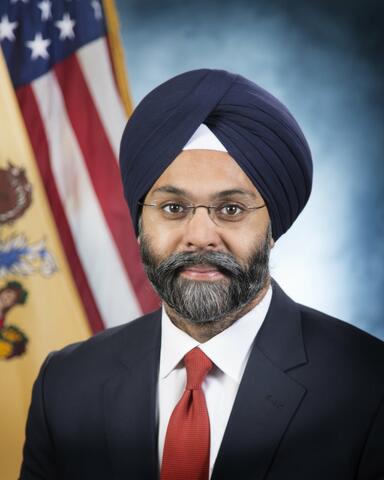TRENTON -- Attorney General Gurbir S. Grewal announced today the distribution of $2.5 million to cancer centers across the country, the result of coordinated litigation pursued in 2015 by all 50 States, the District of Columbia, and the Federal Trade Commission (FTC) against sham cancer charities.
The $2.5 million was recovered through a settlement of a landmark lawsuit against four affiliated sham charities – the Cancer Fund of America, Inc., The Breast Cancer Society, Inc., Cancer Support Services, Inc., and the Children’s Cancer Fund of America – and their founder James Reynolds and other individuals.
Through the settlement, each sham charity was shut down, the individuals responsible for fronting the false charities were banned from charity or fundraising activities for the rest of their lives, and the federal and state plaintiffs received judgments for the full amount of the alleged fraud. The settlements also put in place a receiver who seized and liquidated all available corporate and personal assets to satisfy those judgments.
The distribution announced today marks the conclusion of the litigation, which was brought in May 2015. The suit represented the first time that all 50 States, the District of Columbia and the FTC joined together to shut down sham charities.
“With today’s action, some of the money that was donated to these sham cancer charities will finally help real cancer patients,” said Attorney General Grewal. “It’s unfortunate that so much money taken in by fake charities never helps anyone but the scammers. That’s why it’s important to make sure that a charity is legitimate before you donate.”
The original lawsuit filed by all 50 states, the District of Columbia and the FTC alleged the so-called charities -- led by defendant James Reynolds and his family members -- bilked the public out of more than $187 million between 2008 and 2012. Specifically, the complaint alleged, the bogus charities used telemarketing and direct mail to portray themselves as legitimate charities that aided cancer patients falsely.
Among other things, the defendants or their telemarketers often told donors their contributions would be used to provide pain medication to children suffering from cancer, transport cancer patients to chemotherapy appointments, and/or pay for hospice care for cancer patients. These claims, however, were false.
In reality, the bulk of contributions collected -- including more than $6 million in New Jersey -- benefited only the individual defendants, their families, friends and professional fundraisers, who often received 85 percent or more of every contribution.
The charities also participated in a “gift-in-kind” program in which they sent drugs that had nothing to do with cancer to other countries. The Complaint alleged that the purpose of this program was to make the organizations appear larger than they were and to hide their high fundraising costs.
According to the lawsuit, the four charities spent significantly more money on salaries than on the goods and services they provided to cancer patients. In addition, much of the money went to fund a luxury lifestyle for a small clique of family members and friends.
Specifically, the defendants were accused of spending charitable donations on such purchases as cruises, jet ski outings, concert tickets, and memberships on dating Web sites—expenditures that were made possible by non-profit boards who rubber-stamped the decisions of the individual defendants.
Other indulgences paid for with the charitable contributions included trips to destinations like Thailand, Las Vegas and Disneyworld, as well as the purchase of designer handbags, jewelry and clothing, and day-to-day expenses such as gas, groceries and utility bills, all paid for with the charities’ credit cards.
The distribution of funds announced today will be transferred to Rockefeller Philanthropy Advisors (RPA) who, under a services agreement with the plaintiffs, will distribute the funds to select health and medical programs targeting breast and pediatric cancer. Eligibility will be determined through an invitation-only application process and is limited to NCI-designated Cancer Care Centers, a designation bestowed by the National Cancer Institute on institutions and programs recognized for their scientific leadership, resources, and the depth and breadth of their research. RPA CEO Melissa Berman noted,
“We are pleased to be part of this landmark process of ensuring that the philanthropic intent of donors is coming to fruition, despite the conduct of bad actors.” RPA will ensure that the funding will serve patients in all 50 states, and will monitor, ensure compliance and provide detailed reporting for all grants awarded.
